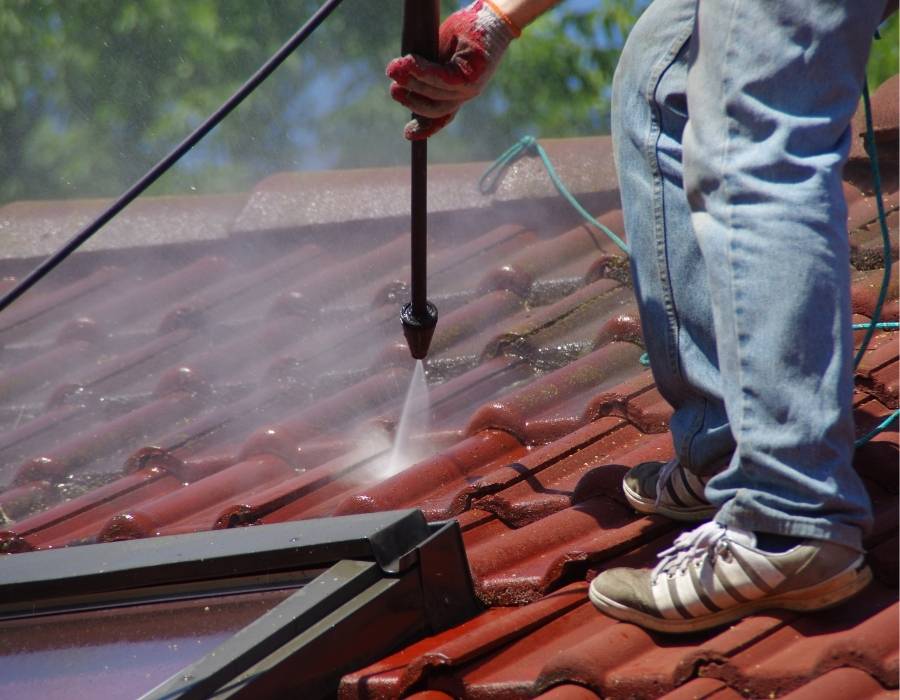Soft Wash vs. Pressure Wash: Safely Cleaning Your Roof Without Damage
A dirty roof can ruin your property’s curb appeal and quietly shorten the lifespan of one of your most valuable investments. But cleaning your roof isn’t as simple as grabbing a hose or calling just any cleaning service. The wrong approach—especially one involving high pressure—can crack shingles, cause water intrusion, and void your warranty.
That’s why understanding the difference between soft wash vs. pressure wash is critical. These two popular roof cleaning methods deliver vastly different results when it comes to safety, effectiveness, and long-term protection.
Understanding Soft Wash & Pressure Wash
Soft Washing
Soft washing is a gentle yet powerful cleaning technique designed to safely remove organic buildup from delicate exterior surfaces. Unlike traditional pressure washing, which relies on high force that can strip away protective coatings or damage materials, soft washing uses a carefully formulated mix of water, biodegradable chemicals, and surfactants. This solution works to break down and eliminate contaminants like algae, mold, mildew, lichen, and grime at the root—without harming the surface underneath. It’s particularly ideal for roofing materials such as asphalt shingles, wood shakes, and clay or concrete tiles, where maintaining the integrity of the surface is crucial.
One of the main advantages of soft washing is its long-lasting effectiveness. Because it targets the root of microbial growth rather than just washing away surface residue, the results typically last much longer than those achieved with standard pressure washing. Additionally, soft washing helps preserve your roof’s lifespan by preventing damage to shingles and tiles, and it’s considered a safer, warranty-compliant option by many roofing manufacturers. It’s a smart choice for homeowners looking to protect their investment while keeping their roof looking clean and well-maintained.
Pressure Washing
Pressure washing is a cleaning method that utilizes a powerful stream of water—typically ranging from 1,500 to 3,500 PSI—to forcefully remove dirt, grime, mold, and other buildup from exterior surfaces. It’s incredibly effective on hard, durable materials such as concrete driveways, brick walkways, stone patios, and metal siding, where the surface can withstand the intense pressure. However, while pressure washing is a go-to solution for tough jobs, it’s not appropriate for every surface—especially when it comes to roofing.
Using high-pressure water on roofing materials like asphalt shingles, wood shakes, or composite panels can do more harm than good. The force can dislodge or crack shingles, drive water beneath the surface, and damage the underlayment or insulation. These effects not only compromise the roof’s structure but can also shorten its lifespan and lead to costly repairs. In many cases, improper use of pressure washing can even void your roof’s manufacturer warranty. For these reasons, pressure washing should be limited to surfaces designed for it—not delicate roofing systems that require a softer, safer touch.
Finding the Right Roof Cleaning Schedule
The ideal frequency for roof cleaning largely depends on your home’s environment and the materials used in your roofing system. In general, soft washing is recommended every 1 to 3 years. However, homes located in humid climates, shaded areas, or near dense trees may require more frequent cleanings to prevent the buildup of algae, moss, and lichen. These organisms thrive in damp, low-light conditions and can cause premature wear if left untreated.
Regular cleaning not only keeps your roof looking its best but also helps preserve its structural integrity and extend its lifespan. Monitoring your roof’s condition and scheduling cleanings as needed—rather than waiting for visible signs of damage—can save you money in the long run and help maintain warranty compliance.
How to Choose the Right Roof Cleaning Provider
Choosing the right roof cleaning provider is essential to protecting both your home and your investment. Look for a company that specializes specifically in soft washing rather than general exterior cleaning. Soft washing requires the proper technique, equipment, and chemical blends to be both effective and safe for your roof. A reputable provider should also be certified and fully insured, offering peace of mind that they meet industry standards and have proper coverage in case of accidents or damage.
A professional roof cleaning company should provide clear before-and-after documentation so you can see the difference and trust the process. Be wary of low-cost contractors who rely solely on pressure washing—what you save upfront may end up costing more in long-term repairs. Prioritize experience, safety, and a proven track record over quick fixes.
The Safe Way to Clean Your Roof
Your roof deserves more than a high-pressure blast. It deserves careful, expert-level cleaning that preserves its beauty, extends its lifespan, and avoids costly damage.
Soft washing is the safest, most effective solution for removing roof stains, algae, and debris—without risking structural harm or warranty voids. While pressure washing has its place on hardscapes, it’s simply too harsh for roofing materials.
Whether you’re maintaining a home or a commercial property, the right cleaning method makes all the difference. Choose soft washing and enjoy a cleaner, longer-lasting roof without the headaches.

